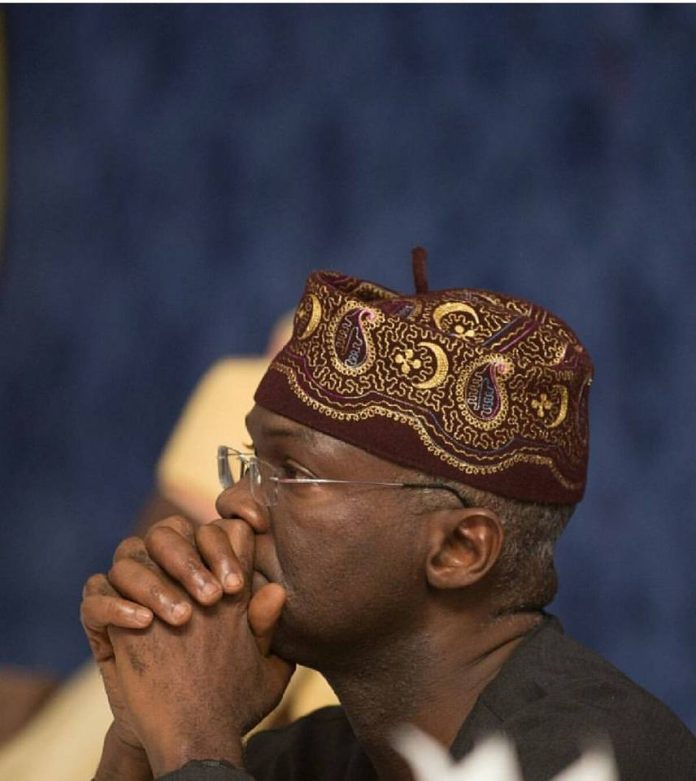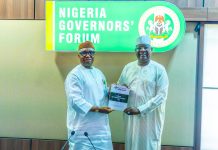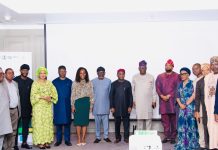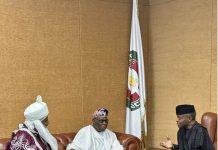The Minister Power, Works and Housing, Mr. Babatunde Fashola SAN, Wednesday reiterated Federal Government’s commitment to enhancing the distribution segment of the Power value chain saying the approval of a N72 Billion Distribution Expansion Programme by the government was a clear demonstration of that commitment.
Speaking at the December 2018 Nextier Power Dialogue in Abuja, Fashola said the Government, as a 40 per cent shareholder, had to make the approval in order to enhance the distribution of power across the country pointing out that although operationally there is 7,000 Megawatts of electricity ready for deployment, the operation was still constrained at the distribution end.
Reiterating the concern of government towards correcting the anomaly, the Minister, however noted that the decision to intervene was done after asking the DisCos where they would want to spend their money within their franchise, if they have it, that could evacuate “some of the power that is available and that can yield a maximum collection report” adding that it was with that data that Government put the amount together that it would inject into the Distribution sector.
The Minister, who quoted the 3rd Quarter Report of the National Bureau of Statistics as revealing that Electricity made the highest contribution of 18 per cent to the 1.8 per cent growth in the nation’s Gross Domestic Product (GDP) recalled the “Thank You” visit of the Gora Community of Nasarawa State to his office early in the week to express their gratitude to the Federal Government over the provision of Solar Power to their Community saying it was a testimony to the growth in electricity supply and increasing accessibility to the rural communities.
The Community delegation, led by its Traditional Head, Alhaji Jafaru Adamu, thanked the government of President Muhammadu Buhari for initiating the rural electrification programme and the Minister for driving it adding that since the installation of the Solar electricity, the Community has consistently enjoyed several benefits hitherto not known to them, especially in the areas of social life, Education and Health.
Also the Minister seized the opportunity of a question to clear the air on an alleged statement made by him in 2014 as to his ability to solve the nation’s power problem in six months explaining that the statement attributed to him was made in 2015 in Lekki in respect of distributing power to the Lekki community within six months from the residual power in an Independent Power Plant earlier commissioned by him to power some government Water Works and Street lighting on the Island.
He declared, “I think it was in 2015 during the run up to the elections and I was in Lekki where we had gone to commission the Lekki IPP. It was Sam Amadi who gave us a license to do an IPP dedicated to power our Water works in Lekki, our Water Works in Victoria Island and our Water Works in Oniru and the street lighting in Lekki Phase 2.
“When we switched on that power plant that night and all of the street lights came on, as I was leaving, the residents accosted me and said “Governor you can’t go; we like this; but how would we get it into our houses”. I explained that it was Eko Distribution Company’s franchise and if they wanted the power in their houses, there was reserved power still in the IPP and if they could tell NERC to issue him a license, he would do the distribution and connect the Lekki residents in six months. That was what I said”.
The Minister recalled that the policy outline laid by his Ministry at inception set out a roadmap to first get incremental power and then go to steady power and then to uninterrupted power, which, according to him, “is not just a function of how much power you have”, but also “how you manage the power”.
“I think that if you followed the policy outline, we set out our roadmap first to get incremental power and then we will go to steady power and then to uninterrupted power and uninterrupted power is not just a function of how much power you have; it is also a function of how you manage the power. So in terms of our first leg of incremental power, we have delivered what we promised. We have increased the power on all sides”, he said.
Fashola pointed out the amount of diesel that he used to power his residence was now less than two years ago adding, “The man who buys the diesel knows and the man who supplies the diesel knows that I don’t buy as much as before. And that is the story from many parts for people on the grid. But that doesn’t mean that there are no problems”.
Responding to a question posed by a participant during the Interactive Session concerning the supply of transformers, Fashola, who reiterated that all the assets that the Ministry of Power used to control for power distribution have been sold by the last administration pointed out that the people now operating the Generation and Distribution segments of power sector are now privately owned companies.
The Minister added, “I am here because I am concerned. If your telephone is not working, it is not the Minister of Communication that you go to; let us be very clear. My role is regulatory, oversight and policy”, adding, however, “I cannot separate myself from the problem; I am trying to get involved to do what the law allows me to do. So the people you should be talking to about transformer is not me; the Ministry does not supply transformer anymore”.
In response to another question bordering on whether or not to cancel the Privatization policy and hand back power to the government, Fashola, who called for caution, declared, “Let’s be careful what we wish for. We wished, many years ago, after 60 years or so of government run power, we wished and decided that Private Sector should take over this Power. That was our decision. No sooner had we decided, five years after, we are now asking government to take it from them. Is that what we really want?”
“So let’s be consistent here and let us understand that the decision to privatize is a matter of policy. When policy is made, it takes time to take effect. When it begins to take effect, its impact takes time to spread. And that is why we can share here that five years ago nobody could talk about mini-grid, we are talking about it now; five years ago nobody was talking about Meter Asset Provider, we are talking about it today, five years ago who dared to go into the military formation to meter them; the President has directed that all the military formations must be metered”.
The Minister said ministries and agencies of government now pay their electricity bills regularly adding, “I just signed the letter for this month because our office is the collection warehouse. This wasn’t happening five years ago. So we are making progress and let no one downplay that”.
“Can we move faster, certainly we can”, he said adding, however, that if the consensus was that government should take it over the power sector from private hands, then there was need to “go back to Parliament and repeal the law; because I asked you, do you want a five-year old to have a moustache?”
Arguing against the reversal of the Privatization Policy, Fashola, who again reiterated the existence of challenges in the sector which, he assured were being dealt with, declared, “But you must decide in this country whether you want to continue to see devils or angels. I like to see angels; my glass is always half full and problems are opportunities for me to show that nothing is wrong with us and to benchmark what I have achieved. There are problems no doubt and we must deal with them”.
According to the NBS Report for Budget 3, the 3rd Quarter GDP result was 1.81 per cent growth; up from 1.50 per cent in Q2 with Electricity as the biggest motivator scoring 18 per cent, Metal Ores 17 per cent, Telecoms 14 per cent, Transportation 11.9 per cent Quarrying and Mining 3 per cent and, for the first time in about six consecutive quarters, the Services Sector grew by 2 per cent.
“It is not enough”, Fashola said adding, “But it means we are heading in the right direction back up. What is also important to share is that the growth was driven by non-Oil Sector and that is important because the growth came in a quarter when oil prices have not done well and that is what this team set out to achieve; to diversify the economy. We welcome the Oil money, but when the oil money suddenly disappears, our prosperity will not go with it and that is important”.
The Minister added, “So, in a period when oil prices began to flounder Nigeria’s economy did not flounder and that is important. But more importantly, who drove the growth? It means that if we continue with the foundations that are being laid-infrastructure- the jobs that all of us want to see will multiply. That is where we are”.
HAKEEM BELLO








